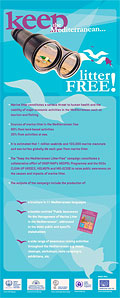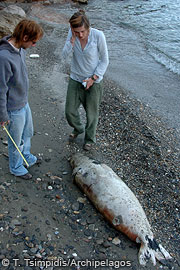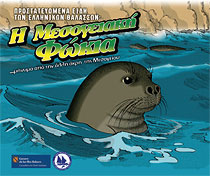

 |
||
 |
||
Vol. 11 (1): June 2008 |
||
Croatia / Greece I / Greece II / Madeira / Mauritania & Western Sahara / Turkey
Greece II
|
 |
|
HELMEPA, in cooperation with the non-governmental organizations Clean-Up Greece and MIO-ECSDE, is implementing a public awareness campaign entitled ‘Keep the Mediterranean Litter-Free’, under the auspices of the United Nations Environment Programme (UNEP).
Awareness raising activities implemented within the framework of the campaign in several Mediterranean countries include voluntary beach cleanups with the participation of schoolchildren, companies’ staff, seafarers, local/port authorities, NGOs and the wider civil society, as well as environmental exhibitions and seminars, drawing and photograph contests. The ‘vehicles’ of the campaign so far include a poster/brochure with useful information on marine litter and advice to all major stakeholders in 11 Mediterranean languages, and a publication in English entitled Public Awareness for the Management of Marine Litter in the Mediterranean.
The latter is based on a proposal by the three NGOs to MED POL for a common regional approach on how to raise awareness and educate appropriately all stakeholders in the Mediterranean about solid waste management. It introduces the basic parameters of the problem and features specific sector-based guidelines for the main stakeholders, i.e. agriculture, industry, the tourism and maritime sectors, regional, national and local authorities. Apart form these specific sectors, the publication has also been developed for use by NGOs, the media and the Mediterranean public at large.
It is anticipated that the campaign, along with other relevant activities of the Mediterranean NGO community, will contribute significantly to the effective implementation of a Regional Strategy to address the problem of marine litter in the Mediterranean, which is currently under development by MED POL and the Regional Seas Programme of UNEP. – Constantinos Triantafillou, HELMEPA.
The Changing face of marine litter, Cover Story, this issue.
 |
|
|
Dead monk seal found at Ikaria. |
A press released issued by Greek NGO Archipelagos on 14 May 2008 claims an alarming increase in strandings and deliberate killings of protected marine mammal species in Greek waters.
Research results, says Archipelagos, point to “an ongoing slaughter”, with “over 45 Striped dolphins, Bottlenose dolphins, Risso’s dolphins, Sperm whales, Cuvier’s beaked whales, Harbour porpoises, but also Loggerhead and Leatherback turtles”, being found dead along Greek coastlines.
Deliberately killed monk seals, the organisation states, were also found at the islands of Ikaria and Syros.
Besides deliberate killing, the organisation also blames “increasing levels of marine pollution”, “marine explosions” and “usage of high frequency sonars during military exercises” for the killings.
The organisation has voiced its intention to draft proposed management measures and practical solutions to address the strandings and deliberate killings.
Although the Archipelagos press release gained widespread coverage in the Greek media, other NGOs in the country have cast doubt on the veracity or interpretation of some of its findings.
Archipelagos. 2008. Worrying increase in strandings/killings of protected marine mammals in the Greek seas. Press release, 14.05.2008.
Kathimerini. 2008. Dead sea mammals mystery, 30 April 2008.
 |
|
|
|
In what is the most recent of several previous incarnations, a monk seal cartoon book for children has been published by the Archipelagos Marine and Environmental Research Institute, with technical backing by TMG sponsor, the Government of the Balearic Islands, Spain. The brainchild of Joan Mayol, of the government’s Endangered Species Service, who composed the text, with drawings by Aina Bonner, the book has had a long run, appearing in various countries and languages.
Although improvements in content and design, as well as refinements for local readership have been implemented along the way, previous editions in black-and- white have appeared in Catalan, French and Arabic, German, Greek and English. Revised colour editions are now appearing in Catalan and Greek, the latter through Archipelagos.
The latest version published by Archipelagos can be downloaded from the Monk Seal Library.
Archipelagos/Government of the Balearic Islands. 2007. Η Μεσογειακί Φώκια. Original text by Joan Mayol, with drawings by Aina Bonner: 1-16. [PDF ![]() 2.5MB]
2.5MB]
Natura 2000 problems
Environmentalists WWF said that most of the areas in Greece that are protected by the EU’s Natura network have not been appointed any body or organization to manage them. In Greece, there are 238 areas and 27 large national parks that have been placed in the Natura program. “Most of these protected areas do not have any management and their boundaries have not been clearly set,” said WWF. (Natura programs, Kathimerini, 25 April 2008)
Shoppers urged to shun plastic
Shoppers are being urged to ditch plastic bags after Athens Mayor Nikitas Kaklamanis announced that reusable, environmentally-friendly carrier bags would soon be introduced to the capital’s supermarkets. Presenting Athens’ membership to the C40 Cities, an international initiative aimed at pooling resources to combat climate change, Kaklamanis said that non-plastic carrier bags would be available in supermarkets from March 1. […]
Environmental groups have long argued that plastic bags present a risk to marine and other animal life, as well as to groundwater quality. An estimated 60,000 tonnes of such bags are believed to end up in Greek landfills yearly. A sample alternative bag unveiled by Kaklamanis at a January 15 press conference included the slogan: “A plastic bag is used once or twice but has a life expectancy of 400 years.” (Shoppers urged to shun plastic, Athens News, 18 January 2008)
Waste deep in plastic
With the lowest recycling levels in Europe and no energy-recovery facilities in the country, Greece’s landfills are being clogged up with plastic
Consider this fact for a minute. Not a single kilogram of plastic is landfilled in Switzerland. And now look at the other end of the scale. Greece missed its European Union target to recycle a measly 15 percent of its plastic packaging waste by the end of 2006 by some distance. While the country is doing better than might be imagined in paper and cardboard recycling (above 70 percent), and more than half of industrial steel is reused, Greece props up the table where plastic is concerned.
By combining the quantities of plastic recycled or burned for energy recovery in 2005, the association of plastic manufacturers in Europe, Plastics Europe, has highlighted Greece’s position as the most wasteful European country in the management of plastic waste, coming below the likes of Cyprus, Malta, Lithuania and Estonia. According to figures given to this newspaper by the Ecological Recycling Society in central Athens, the country managed to recycle only 30,000 of the 300,000 tonnes of plastic packaging waste produced in 2006. […] (Waste deep in plastic, Athens News, 8 February 2008)
Lax disposal of toxic waste draws EU ire
Tons of dangerous refuse ending up in landfills due to inadequate planning
The European Commission is expected to issue a stern warning to Greece today for failing to adequately manage hundreds of thousands of tons of toxic waste produced in the country every year, which is believed to be ending up in landfills.
According to the Commission, which first warned Greece about toxic waste in 2005, no measures have been taken to ensure that some 330,000 tons of toxic waste produced every year are safely disposed of. Another 600,000 tons of such waste has been buried in inappropriate locations, chiefly on industrial sites, according to the EC.
The EC has highlighted a list of measures that need to be taken to prevent the ongoing environmental damage and the potential health risks posed by piles of festering waste across the country, described by experts as “toxic time bombs.” If Greece fails to take action it faces a large fine.
Authorities have been asked to draw up maps showing proposed sites for dumping toxic waste. At the same time, the central government will have to specify the powers each region has for disposing of the waste it produces.[…]
Another EU requirement is that waste be categorized before it is disposed of. Certain types of waste – like animal waste and polychlorinated biphenyls (used in the manufacture of plastics) – are currently not categorized as dangerous substances. (Lax disposal of toxic waste draws EU ire, Kathimerini, 30 January 2008)
Acting on Dimas’s recommendations
The Greek public can only agree with European Environment Commissioner Stavros Dimas, who on Monday called on the Greek government to implement a more effective environmental strategy for the country.
Greece is facing more ecological challenges than any other European Union country, but, regardless, does not have an autonomous environment ministry to deal with these problems. In fact, environmental issues are left to the devices of Greece’s Public Works Ministry.
Dimas’s recommendations were made in a rather gentle fashion because he happens to be a Greek citizen. However, as long as Greece continues to use so-called creative accounting in its measuring of its carbon dioxide (CO2) emissions while failing to bring national legislation in line with EU regulations, the principal casualties will be the country and public health – not the European Commission.
It is Greece’s image that is being tarnished by the EU and UN, not that of Commissioner Dimas. (Acting on Dimas’s recommendations, Kathimerini, 24 January 2008)
MPA TIP: The fundamental criterion for MPA success
“MPA Tip” is a recurring feature in MPA News that presents advice on planning and management gathered from various publications on protected areas. The purpose is two-fold: to provide useful guidance to practitioners, and to serve as a reminder of valuable literature in the MPA field.
MPA News excerpted the following tip from Guidelines for Marine Protected Areas (IUCN, 1996), edited by Graeme Kelleher […]
Tip: The fundamental criterion for success in MPA planning and management is to bring in from the beginning every significant sector that will affect, or be affected by, the MPA. The reasons for this are simple. First, if those in a sector like fisheries or tourism are not involved from the beginning, they will be inclined to see the MPA planners and managers as either not interested in their sector or actively trying to disadvantage their interests. Second, no expert, however competent, has the detailed knowledge that would allow him or her to define adequately the interests of most sectors. (MPA Tip, MPA News 9 (4):October 2007)
Alonnisos Marine Park in trouble
A crisis, lesser in scale yet reminiscent of the Galapagos conflict between park officials and local businessmen & fishermen, is brewing in the otherwise quiet and offbeat island of Alonissos, part of the Sporades island group in North Western Aegean. Alonissos is the only inhabited island of the Alonissos National marine park, which was set up in 1992 to protect the endangered Monachus Mediterranean monk seal (only 300-400 remaining in Greek seas). […]
Local business interests attempted on the 3rd of August to occupy the offices of the marine park, however they were resisted by office personnel, and thus confined themselves to blocking the entrance to the park’s offices and throwing eggs & yogurt. The police apparently kept a low profile, not wanting to take sides, with no arrests reported. Then on August the 4th a protester verbally abused and physically attacked the coordinator of the Alonissos park Vassilis Kouroutos, a leading marine biologist and veteran conservationist, who has since pressed charges. Tensions are still high and park officers expect further vandalisms to their boat and offices.
The protesters allege they are being held ‘hostage’ to a ‘strict’ conservation regime which ‘scares away’ tourists and developers. They appear particularly irate about patrols and spot checks (and fines) to boats carrying tourists within the marine park. Protesters have organised a petition, signed by 1,500 locals, and sent it the ministers, local MPs and the prefecture of Magnesia, demanding a renegotiation of park boundaries. And they have allies in some unlikely places: the current head of Mom, the society for the protection of the Mediterranean seal (founded and previously headed by Vassilis Kouroutos) was quoted by Ethnos, a daily traditionally supportive of the (300,000 strong) recreational hunting & fishing community, that it was a mistake to ban diving tourism within the Park, while the park authorities ‘were to blame’ for falling out with the local community [...] (Sealing the fate of the Monk Seal? Islanders protest against the National Marine Park of Alonissos in Greece, EcoClub.com, Ecotourism News & Releases, 7 August 2007)
EndQuoteSea Change “It’s big; enormous in fact. But it’s certainly not clever. There is a massive area of circulating rubbish in the Pacific Ocean, stretching from the coast of California to Japan. Around 100 million tons of floating, mostly plastic, debris bobs just below the surface of the waters, covering an area twice the size of the continental United States. This island of trash is not visible from satellite photographs because the plastic is translucent and lies beneath the surface. But it is there. And it is growing. We in Europe cannot afford to shrug off the problem. The Mediterranean is the most polluted sea in the world, with 2,000 pieces of plastic per square kilometre. The problem is less conspicuous because most of it lies on the seabed and there are only very weak tides to bring it together. Our polluted seas are a depressing phenomenon. These colossal tracts of trash are an indictment of how careless with the environment we have become. Historically, the flotsam of the oceans has biodegraded. But modern plastics take hundreds of years to disintegrate.” Source: Sea Change, Leader, The Independent, 5 February 2008. |
Mediterranean News continues with Madeira, Mauritania & Western Sahara and Turkey...
Copyright © 2008 The Monachus Guardian. All Rights Reserved |